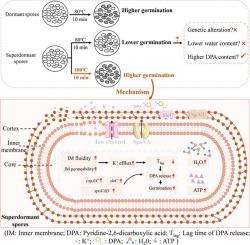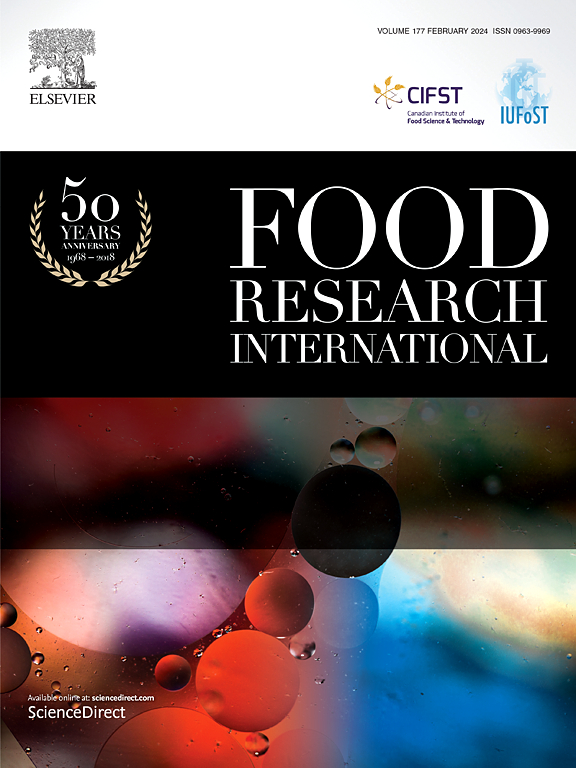Effect of heat activation on the germination of superdormant Clostridium perfringens spores: A requirement for elevated temperature
IF 8
1区 农林科学
Q1 FOOD SCIENCE & TECHNOLOGY
引用次数: 0
Abstract
The “germination-inactivation” is a common strategy for controlling Clostridium perfringens spores in meat products. However, the presence of superdormant spores limits its effectiveness. This study investigated the factors contributing to germination defects, and elucidated the germination effect and mechanism of heat activation on superdormant spores. Compared with dormant spores, superdormant spores showed lower germination and higher heat resistance (P < 0.05). In contrast, re-sporulated spores exhibited similar germination, indicating that germination defect was not due to genetic changes. Elevated levels of pyridine-2,6-dicarboxylic acid (DPA) in the superdormant spores may be a potential contributor to their germination defect (P < 0.05). Treatment at 100 °C for 10 min efficiently promoted superdormant spore germination, as evidenced by enhanced ATP synthesis, colony formation efficiency and DPA release (P < 0.05). Further studies revealed that inner membrane permeability and fluidity of the spores were enhanced, which promoted K+ efflux. The efflux reduced the lag phase preceding DPA release by regulating the spores closer to germination threshold, ultimately facilitating germination. Furthermore, upregulation of germination-related genes also contributed to DPA release of the spores. In chicken meat, the treatment promoted the germination of approximately 99 % of superdormant spores, enhancing their subsequent inactivation at 90 °C. These findings provide novel insights for the germination characteristics of superdormant C. perfringens spores and their effective control in meat products.

热活化对超休眠产气荚膜梭菌孢子萌发的影响:对高温的要求
“发芽灭活”是控制肉制品中产气荚膜梭菌孢子的常用策略。然而,超级休眠孢子的存在限制了它的有效性。研究了萌发缺陷的影响因素,阐明了热活化对超休眠孢子萌发的影响及其机理。与休眠孢子相比,超休眠孢子萌发率较低,耐热性较高(P < 0.05)。相比之下,重孢子孢子表现出相似的萌发,表明萌发缺陷不是由遗传变化引起的。超休眠孢子中吡啶-2,6-二羧酸(DPA)水平升高可能是其萌发缺陷的潜在因素(P < 0.05)。100℃处理10 min可有效促进超休眠孢子萌发,ATP合成、菌落形成效率和DPA释放均有提高(P < 0.05)。进一步研究发现,孢子的细胞膜通透性和流动性增强,促进了K+的外排。外排通过调节孢子接近萌发阈值,减少了DPA释放前的滞后期,最终促进萌发。此外,萌发相关基因的上调也有助于孢子释放DPA。在鸡肉中,该处理促进了大约99%的超级休眠孢子的萌发,增强了它们随后在90°C下的失活。这些发现为超休眠产气荚膜芽孢杆菌孢子的萌发特性及其在肉制品中的有效防治提供了新的认识。
本文章由计算机程序翻译,如有差异,请以英文原文为准。
求助全文
约1分钟内获得全文
求助全文
来源期刊

Food Research International
工程技术-食品科技
CiteScore
12.50
自引率
7.40%
发文量
1183
审稿时长
79 days
期刊介绍:
Food Research International serves as a rapid dissemination platform for significant and impactful research in food science, technology, engineering, and nutrition. The journal focuses on publishing novel, high-quality, and high-impact review papers, original research papers, and letters to the editors across various disciplines in the science and technology of food. Additionally, it follows a policy of publishing special issues on topical and emergent subjects in food research or related areas. Selected, peer-reviewed papers from scientific meetings, workshops, and conferences on the science, technology, and engineering of foods are also featured in special issues.
 求助内容:
求助内容: 应助结果提醒方式:
应助结果提醒方式:


